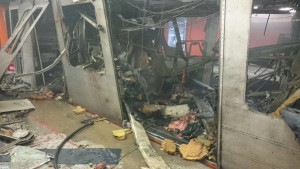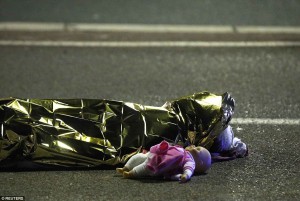An abandoned watch outside the concert hall attacked in Paris, November 2015
The Metro car blown-up in Brussels, March 2016
Nice, 14 July 2016
15 July 2016 – And the atrocities and Twitter hashtags continue. We are numb. The horror of Paris, and Brussels and Nice were sickening. To find myself (twice) resident witness in Paris last year for events of fear, horror, rage and shock … channeled and shaped into a wave of collective vengeance and hatred … and to see a repeat in Brussels (where I spend half my time) and now Nice (on the same promenade I just spent Christmas and New Year’s) is stupefying. My wife and I were in Italy for Easter Break when the attacks hit Brussels. But the terrorists hit the same Brussels Metro station my wife uses to get to work at that verysame time of day, and in the exact airport departure area from which we had left a scant three days previous. “There but for the grace of … whatever.”
The bloodshed and the scale and intensity of these murders will only become more outlandish and “creative”, as witnessed in countless locations over the last few months across the globe in Australia, Bangladesh, Iraq, Turkey, the U.S. … everywhere.
Over the last 6 years I have been immersed in these events due to my e-discovery work in the Levant and in Europe, plus my intense interest in the area – purely as a fact-finding trip of my own in keeping with a personal agenda. There is an Italian phrase that describes the people (Arabs, Greeks, Italians, etc.) who populate the Mediterranean … “una faccia, una razza” (one face, one race) … that is perhaps far too simple an expression but meant to capture a similar set of values, religions, customs, food, etc. across the region. I spend most of my time in and around the Med but not enough in the core of the Middle East and that was my intent.
I have been fortunate in that I have had the opportunity to travel across Israel and all through the West Bank, and through Jordan, eating/shopping/talking with people in Ashkelon, Haifa, Jerusalem and Tel Aviv, etc. but also Amman, Hebron, Jericho, Nablus and Ramallah. This coming fall I make my first trip to Iraq.
I have also had the splendid advantage over the past two years to engage in a series of conversations with my multitudinous circle of contacts in the military, law enforcement, cyber world and Middle East (who will be noted and quoted throughout this series when they permit) and those chats have intensified.
And like most of my colleagues who work in this area, I have a “dirty computer” – a stand-alone machine connected to cyber space outside of my regular cyber connections, totally disconnected from my normal world, so I can explore the Dark Net, the side to the Internet most people have never visited (a big hat tip to my colleagues at FireEye and IBM Cyber Security for the assist on setting that up). I use … among others … Tor Hidden Services, or the Tor Network, an encrypted, hidden network of about 60,000 websites that can’t be accessed with a traditional browser like Chrome or Firefox. Its users include criminals, trolls. And extremists. I follow multiple ISIS-related and other extremist sites, the Arabic portions translated by my Language Unit which is composed of various linguists who are subject matter experts in numerous fields.
Many have encouraged me to try and parse my perceptions in all of this and that is the intent of this series. I have ambitiously tagged this post “Part 1” with the intent to produce a 4-part series. We’ll see what time permits.
The title of this piece, by the way, comes from Simon Kuper, a Paris neighbor, who I had the opportunity to video interview a few years ago at the Georgetown Law Corporate Counsel Institute in Paris. He is a well-known writer for the Financial Times, based in Paris. He had interviewed a number of people on his street that horrible weekend in Paris last November, one of whom asked that question: “With what perception must I perceive this?”
I have set out a formidable task for this series, dealing with some intractable issues. This post will focus on some overall perspectives on what Nice and similar attacks are about, and then end with a rant. My regular readers are familiar with my rants.
What Nice, (maybe Orlando), Paris, and other recent attacks are about
In 2014, the Wahhabi Salafi vanguard, ISIS from the minarets of its self-styled Caliphate based in Raqqa Syria, called for death and terror on the streets of France, the U.S., the UK, Australia, Canada and Europe and their evil minions take up the carrion call all over the West including last November in Paris and now it seems in Nice.
ISIS calls for Salafi jihadi’s to:
– run down infidels in cars,
– randomly behead civilians on the streets,
– attack the families of military personnel and
– shoot or knife infidels and their leaders.
We have seen each of these acts all around the world. In October 2014, in Canada, we saw a Wahhabi Salafi Islam convert murder a Canadian soldier by running him and another soldier down in a car pointing his finger to heaven seeking Allah (in the Salafist self-righteous style) as his justification for doing so. We have seen car attacks and beheadings across Belgium, France and the UK.
For the last several years the Wahhabi sect websites were calling for action on 14 July (France’s national day, most important holiday). Nobody has yet (at the time of writing this article) claimed responsibility for the Nice attack but supporters of the Islamic State (ISIS) terror group have been celebrating it across social media:
“The number of those killed had reached 62 French crusaders and sinful infidels in Nice, France. God is great, God is great!”
Frightening? You bet. They are breaking all our rules. War should be fought between soldiers. Involving innocent civilians is wrong. A soldier’s goal is to live, not die, right? But their moral surety is crashing head on into ours. They argue they are using the most effective weapon of war – their lives – against a larger power. There are two sides to this bloody tale and we’re afraid to admit it.
Why is it so incendiary in our culture even to suggest they are ready to die for what they perceive as the greater good? We are both working from a moral imperative. Each of us can point to a holy reference that justifies our moral stance. The reason we dismiss terrorism is because they aren’t killing in the manner that the West kills. Who is to be applauded here for moral supremacy?
Because their methods are repugnant to us, it is easy to forget that suicide bombers in Chechnya, France, Iraq, Israel, Sri Lanka, Turkey … wherever … are fighting a war for what they see as occupation of their homelands. There are many, diverse academic and strategic studies (from America, Israel, Saudi Arabia) that independently say the same thing.
Does that make the killing of innocent civilians any more morally palatable to us? We in the West scream “NO!” without hesitation. To us the image of an army of “martyr seekers” marching with explosive packs around their waists and holding detonators is the stuff of sci-fi nightmares. If we begin to see terrorism for what it is – a freshman entry into the arsenal of war – that doesn’t mean we’re likely to get any closer to holding hands and singing Kumbaya together anytime soon.
News that the US is sending 560 more troops to Iraq as part of the push to recapture the northern city of Mosul from ISIS is being seen as further evidence that the jihadis are on the run. Yes, surveys show ISIS has lost 12 per cent of its self-declared caliphate in Syria and Iraq so far this year, after a shrinkage of 14 per cent in 2015, feed into this narrative. So, too, in its grim way, does the spate of terror attacks with which Isis has marked Ramadan, from Baghdad to Bangladesh, and Medina to Istanbul.
Some interpret this proliferation of atrocity – the attacks at a Shia market in Baghdad that killed almost 300, and at Istanbul’s Ataturk international airport, where 45 died, were especially savage – as an index of jihadi failure as ISIS territory contracts.
No. Wrong. This seems overly reductive. ISIS has always launched far-flung attacks and switched between, as well as combined, regular and irregular warfare. Alexander Athos, a colleague who has an encyclopedic mindset on all of this stuff, puts it like this:
The scale of this Sunni caliphate’s ambition should have become clear from the ISIS assault on Paris last November – it aims to intensify the war at home and abroad, advancing and retreating according to need. The attacks on Paris, Brussels, Istanbul, Nice and elsewhere are diversions. But they are also provocations intended to lure more western “crusaders” and Shia “idolaters” into the killing fields of Syria and Iraq.
Simply put, ISIS’s core calculation according to Alexander is threefold:
- that however much territory it loses, it will still be swimming in a sea of alienated Sunni inside the shell states it infests such as Iraq and Syria;
- that Iran and its Arab allies – such as Lebanon’s Hizbollah, Bashar-al-Assad’s Syria or the Shia-dominated government in Baghdad – will continue to supply it with an alibi for its jihad; and
- that neighboring states such as Turkey and Saudi Arabia, Sunni powers also ranged against Iran’s Shia Arab axis, are vulnerable to its reach and message.
It is our instinct to see the terrorist act itself as an inflammatory catalyst. But there is a dead end to our indignation. My realization if that terrorism is a snapshot of our time, an ugly freeze-frame of war today. The greater dirty truth? The lines of morality in war have forever been changed.
And oh the byzantine labyrinth of Middle East politics
This paragraph is but a short discussion of the bigger political picture and why terrorism is a terrible symptom of a larger political disease. This is a mere overview. But to get an idea of why the Middle East is a region of great complexity reflecting overlapping contradictory features at all levels of political organization, especially the interplay of ethnic, tribal, and religious tensions internal to states as intensified by regional and geopolitical actors pursuing antagonistic policy agendas – then please read one of my earlier posts.
For five years Turkey had allowed Islamist rebels to use its territory as a launch pad to attack the Assad regime in Syria, during which Isis implanted lethal cells. Yet Turkey’s overwhelming priority has been to stop its Kurdish minority from linking up with Syrian Kurds, who are consolidating self-governing territory just across the border, akin to Kurdish home rule in northern Iraq. Until now, Recep Erdogan, Turkey’s neo-Islamist president, has treated ISIS as a secondary issue, painting it as part of a western-inspired conspiracy to do him and his country down.
Saudi Arabia, meanwhile, is overwhelmingly concerned to halt what it sees as Iran’s predatory advance through Arab lands, and finds itself in uncomfortable competition with ISIS as to which of them is a more credible scourge of the Shia.
More important than calculations of whether territorial shrinkage prompts terrorist offensives, therefore, is to search for ways of immunizing a susceptible Sunni minority against jihadi contagion. Said Fred Kaplan, a highly-recognized pro on the Middle East:
The US-led invasion of Iraq in 2003 replaced a Sunni minority regime with a Shia-dominated one. While calling for the downfall of the Assad regime from 2011, the west declined to back Sunni-majority rebels in Syria. From what it painted as a betrayal, ISIS fashioned the fanciful idea that Sunni worldwide – about 1.3bn of 1.6bn Muslims – are a victimized minority it alone can defend.
How to counter this? So long as the Assads remain in place in Syria, supported by Russia and Iran, striking civilian targets with impunity and unmolested by the US-led coalition fighting ISIS in Iraq and Syria, the task looks impossible. American reliance on Syrian and Iraqi Kurdish fighters on the ground, and the US-backed Iraqi government’s dependence on Iranian-trained Shia militias, greatly help ISIS to posture as the shield of the Sunni Arabs.
Had enough? Me, too. End result? There are going to be even more broken states and no way to put them back together again.
On a closing note, a rant: “My demagoguery is better than your demagoguery!”
The bile coming out of the U.S. turns your stomach. To make statements that “the Islamic threat does not exist because of Western policies in the Middle East” is insane. To say this is all “religious” and not due to external, non-doctrinal factors is mindless. Yes, I will address the dark Islamic trinity (Qur’ an, Hadith and Sunna) which compels the Muslim to reach out to a world without Allah in only three ways. Complex stuff but you need to understand it.
And granted: all political campaigns are notorious for the damage they do to truth, but I take most umbrage with Donald Trump who has erased any lines that would segregate rumors, facts, mistakes and outright falsehoods.
The complexity of the Middle East is beyond U.S. sound bites. The Middle East is complicated stuff. I have made numerous trips yet still cannot wrap my pathetic Western mind around it. Yet given the carnage of America’s wars and conflicts across the Greater Middle East and Africa, from Afghanistan to Yemen to Libya you’d think folks would get it. I am prone to say “It’s about the history, stupid!”
But, alas, Americans have been trained to be entertained, not informed. They have an embarrassment of educational opportunities denied to most in the world and yet they live in the squalor of anti-intellectualism made worse by the conditions of their contemporary lives.
Americans have evolved into a species of semi-conscious anti-rationalism, feeding on and fed by an ignorant popular culture of video images and unremitting noise that leaves no room for contemplation or logic. People never read books, they can’t concentrate on anything significant for more than a minute or two, and as a result they don’t really think anymore. Lulled by the “pacifier” of “infotainment,” their civic and political decisions emerge from a confused welter of laziness, reckless emotion and prejudice. And boy does Donald Trump know how to stir things up.
The decision to wage the first Gulf war showed a total disregard for long-term factors, particularly the risk of deepening the existing cultural, social, political, and imaginary rift between the Western countries and the Arab world.
That war was waged in a region where all problems are not only interdependent but tied together in a series of Gordian knots. And that’s why many expressed relief because that war was short. As noted in a long piece in the French newspaper Le Monde in 1991 by Cornelius Castoriadis (a Greek-French philosopher and a professor at the Sorbonne when I was a student there in the 1970s):
“to our great relief, it allowed us to avoid a series of catastrophes a long and intractable war would have set off had it run long, and had we toppled Saddam Hussein. Had Hussein been toppled what a Pandor’s box would be unleashed”.
He reminded us of “unintended consequences, sometimes unknowing consequences” noting that “who would have thought in 1919, after the Treaty of Versailles, that the main effect of the 1914-1918 war would be not the weakening of Germany and the sidelining of the USSR but the unfurling of these two powers under totalitarian banners?”
He was heartened that when the Gulf War fighting stopped, Bush and his Secretary of State James Baker began to establish a “linkage” between the Kuwaiti question, the Israel questions, the Palestine question, the “monstrous, most virulent Middle East problems” that they had previously refused to link.
Alas, what followed in subsequent years was … cold realpolitik and chaos. Culminating after 9/11 into the “fire, ready, aim” approach led by Bush II who ordered a ground war in Iraq without sufficient troops to control the country, without a true grasp of Iraq’s Shiite-Sunni sectarian dynamics, and without any realization that, in destroying the Sunni Taliban regime in Afghanistan and the Sunni Baathist regime in Iraq, we were destroying both of Iran’s mortal enemies and thereby opening the way for a vast expansion of Iran’s regional influence. Despite numerous warnings and detailed analysis provided by his father’s advisors.
We were in a hurry. And when you’re in a hurry you ignore complexities that come back to haunt you later.



